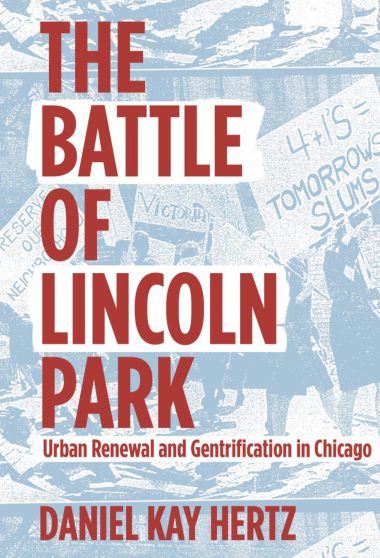
In 1927, a women’s clothing magnate purchased two properties on Chicago’s North Side, hoping to recreate the magic of the arts colonies he had visited in Montmarte, Paris. At the time, the area contained a mix of aging flats and townhomes with predominantly working class tenants.
But within two generations, the Old Town Triangle was among the wealthiest inner-city communities in the country, driven by a movement of middle-class professionals looking for the comfort of the suburbs with the proximity and cosmopolitanism of the city. And their wealth was rapidly spilling over into the broader Lincoln Park neighborhood that surrounded it.
The Battle of Lincoln Park tells the story of how people with clashing visions and values fought to determine the path “gentrification” would take before anyone was using that word. Calling on the power of private funds, public policy, moral appeals, and both nonviolent and violent protest, residents of Old Town and Lincoln Park struggled over the meaning of “desirable” homes, “neighborhood character,” and what kind of city Chicago should be. The outcomes set the tone for profound changes to the city that are still unfolding today.
“When it comes to matters of place, policy, and equity in Chicago, Daniel Kay Hertz is one of the most important and incisive commentators we’ve got.”
Eve L. Ewing, Assistant Professor, University of Chicago School of Social Service Administration; author of Ghosts in the Schoolyard: Racism and School Closings on Chicago’s South Side
“The Battle of Lincoln Park reminds us that urban planning is not happenstance in the city of Chicago. As Chicagoans push back against disinvestment and displacement in certain neighborhoods today, Daniel Kay Hertz is here to show us that history is important to remember.”
Natalie Y. Moore, author of The South Side: A Portrait of Chicago and American Segregation
“The Battle of Lincoln Park is insightful, well-written, deeply researched and engaging, a fascinating tale of the century-long process of gentrification in one Chicago neighborhood.”
Leah Boustan, Professor of Economics, Princeton University, and author of Competition in the Promised Land: Black Migrants in Northern Cities and Labor Markets
“Hertz ably translates matters of public policy into laymen’s terms…. an incisive and useful narrative on the puzzle of urban development.”
Kirkus Reviews